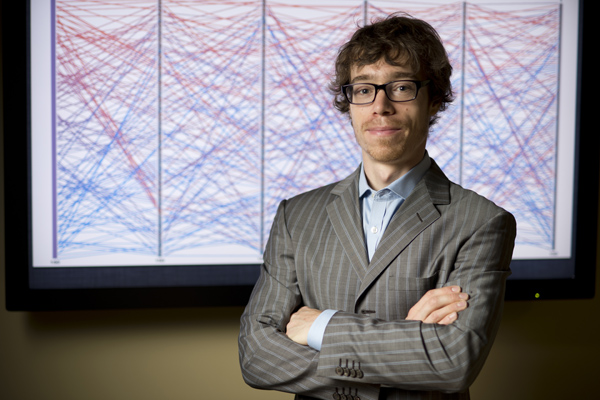Big data’s role in business innovation

A tweet. A product review on Amazon.com. A Facebook picture with a location stamp. All of these represent digital footprints left behind by online users, and collectively amount to large data sets—or so called “big data”—that researchers use to analyze human behavior and social trends.
New assistant professor Christoph Riedl will take an interdisciplinary approach to examining these data to shed light on solutions to societal challenges in business and innovation. In particular, he will apply his interests in data science and computational social science to study substantive research questions in areas such as decision-making by individuals and groups, online social networks, and teamwork and productivity.
“I’m particularly drawn to how we can use modern communication tools, through which large numbers of people can work together, to solve existing problems or tackle new problems,” said Riedl, who joins the faculty this fall with joint appointments in the D’Amore-McKim School of Business and the College of Computer and Information Science. Prior to Northeastern, he worked as a post-doctoral fellow at Harvard Business School and Harvard University’s Institute for Quantitative Social Science.
One of his ongoing projects is focused on word-of-mouth. While positive online word of mouth is known to drive product sales, Riedl said less is known about what drives word-of-mouth itself. He examined 280,000 online consumer reviews of more than 430 movies, focusing on the volume of and disagreement among previously posted film reviews. Further, he looked at how those factors influence whether someone new is likely to chime in and how previous reviews may influence the new reviewer’s take. He found that disagreement draws more people into the conversation, but that people’s reviews are often influenced by what others have argued.
Identifying such social influence, he explained, can help researchers better understand the joint decision-making process in business.
In other research, Riedl is exploring whether social media activity can provide the same rich, tangible social connections formed in the real world. After surveying Twitter users and using data collected directly from Twitter to observe their online activity, Riedl and his colleagues found that social awareness, social presence, and usage frequency have a direct effect on social connectedness and do indeed help people build social capital.
Riedl will continue to work on innovative projects like these as a member of the NULab for Texts, Maps and Networks—the university’s research-based center for Digital Humanities and Computational Social Science.
To illustrate the big-picture implications of big data, he noted that for example geo-location data from Twitter posts could help shed light on how individuals and groups behave; how they migrate on a city level; and how their activity varies when they’re commuting to work compared to when they’re relaxing on the weekend.
“It’s a rich environment to study human behavior,” he said.





